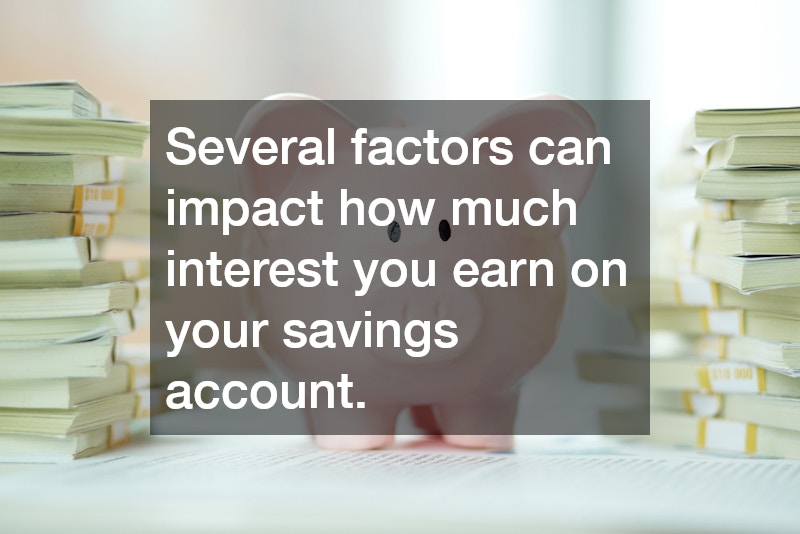
When it comes to building wealth and managing your finances, a savings account is one of the most popular tools available. Not only does it offer a secure place to store your money, but it also earns interest over time, helping your savings grow. Understanding how savings account interest works is essential for making the most of your financial resources. In this blog, we’ll break down the key aspects of how interest is calculated, what factors affect it, and how you can maximize your savings account savings.
What Is Savings Account Interest?
Savings account interest is the money your bank or credit union pays you for keeping your money in their institution. Essentially, the bank is “borrowing” your money and, in return, pays you interest for the privilege.
Interest is expressed as an annual percentage yield (APY), which is the total amount of interest you can earn in one year.
For example, if your bank offers a 1% APY on your savings account and you have $1,000 deposited, you’ll earn approximately $10 in interest over the course of the year. The more money you save, and the higher the interest rate, the more you can earn from your savings account savings.
How Is Interest Calculated?
The interest you earn on a savings account is typically calculated on a compound basis, which means the interest is calculated on both the principal (the initial amount you deposited) and any interest that has already been earned. This allows your savings account savings to grow faster than if interest were calculated only on the principal.
Here’s how compound interest works:
Principal: This is the initial amount of money you deposit into your savings account.
Interest Rate: The interest rate, expressed as APY, determines how much interest you’ll earn annually.
Compound Frequency: Interest can be compounded daily, monthly, quarterly, or annually. The more frequently interest is compounded, the more you’ll earn over time.
For example, let’s say you deposit $1,000 into a savings account with an APY of 1%, and the bank compounds interest monthly. After one month, your interest will be calculated as follows:
$1,000 (principal) x (1% ÷ 12 months) = $0.83 interest earned for the first month.
The next month, your interest will be calculated on $1,000.83, and so on. Over time, the compounding effect can lead to significant growth in your savings account savings.
Factors That Affect Savings Account Interest
Several factors can impact how much interest you earn on your savings account. Here are some of the key considerations:
Interest Rate (APY): The higher the APY, the more interest you’ll earn. Different banks and credit unions offer varying APYs, so it’s important to shop around for the best rates. Online banks often offer higher interest rates than traditional banks because they have lower overhead costs.
Deposit Amount: The more money you have in your savings account, the more interest you’ll earn. Even if the interest rate is the same, a larger balance will result in greater interest payments.
Compound Frequency: As mentioned earlier, how frequently interest is compounded—daily, monthly, quarterly, or annually—will affect how much interest you earn. More frequent compounding leads to higher earnings.
Fees: Some savings accounts charge monthly maintenance fees, which can eat into your interest earnings. Be sure to choose an account with no fees or minimal fees to maximize your savings account savings.
Inflation: Inflation can reduce the purchasing power of the interest you earn. If inflation is higher than your interest rate, the real value of your savings could decrease over time. That’s why it’s important to find an account that offers a competitive interest rate.
How to Maximize Your Savings Account Earnings
To get the most out of your savings account savings, consider these strategies:
Choose a High-Interest Savings Account: Look for savings accounts that offer higher APYs. Online banks, credit unions, and high-yield savings accounts tend to offer better rates than traditional banks.
Take Advantage of Compounding: The more frequently interest is compounded, the faster your savings will grow. Look for accounts that compound interest daily or monthly rather than annually.
Minimize Fees: Choose a savings account with no monthly fees or minimum balance requirements. Fees can erode your interest earnings, so it’s important to avoid them whenever possible.
Automate Savings: Set up automatic transfers from your checking account to your savings account. This ensures that you consistently contribute to your savings, helping it grow over time.
Consider Inflation-Protected Accounts: If you’re concerned about inflation reducing the value of your savings, consider accounts or investments that offer protection against inflation, such as Treasury Inflation-Protected Securities (TIPS).
.




